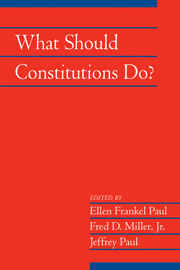Book contents
- Frontmatter
- Contents
- Introduction
- Acknowledgments
- Contributors
- What Are Constitutions, and What Should (and Can) They Do?
- Constitution and Fundamental Law: The Lesson of Classical Athens
- Contract, Covenant, Constitution
- Constitutionalism in the Age of Terror
- The Liberal Constitution and Foreign Affairs
- Do Constitutions Have a Point? Reflections on “Parchment Barriers” and Preambles
- The Origins of an Independent Judiciary in New York, 1621-1777
- Foot Voting, Political Ignorance, and Constitutional Design
- Pluralist Constitutionalism
- Deliberative Democracy and Constitutions
- The Constitution of Nondomination
- Can We Design an Optimal Constitution? Of Structural Ambiguity and Rights Clarity
- Index
The Constitution of Nondomination
Published online by Cambridge University Press: 05 June 2012
- Frontmatter
- Contents
- Introduction
- Acknowledgments
- Contributors
- What Are Constitutions, and What Should (and Can) They Do?
- Constitution and Fundamental Law: The Lesson of Classical Athens
- Contract, Covenant, Constitution
- Constitutionalism in the Age of Terror
- The Liberal Constitution and Foreign Affairs
- Do Constitutions Have a Point? Reflections on “Parchment Barriers” and Preambles
- The Origins of an Independent Judiciary in New York, 1621-1777
- Foot Voting, Political Ignorance, and Constitutional Design
- Pluralist Constitutionalism
- Deliberative Democracy and Constitutions
- The Constitution of Nondomination
- Can We Design an Optimal Constitution? Of Structural Ambiguity and Rights Clarity
- Index
Summary
INTRODUCTION
I argue in this essay that procedural constitutional guarantees of market freedoms best protect individuals from domination. One corollary of my argument is that political theorists who attach paramount importance to freedom as nondomination should embrace market freedoms no matter what other divergent commitments they may have. In particular, Philip Pettit's claim that various forms of state interference with private markets are needed to forestall domination will prove to be unwarranted. Another corollary of my argument is that market freedoms are best protected by procedural rules for political decision-making, as opposed to constitutional guarantees of private property and other substantive rules.
A moral presumption against interference has been more or less explicitly advocated by the political tradition known as “classical liberalism” or (sometimes to denote the versions least sympathetic to the state) “libertarianism.” On this tradition, a legal system ought to protect spheres of mutual noninterference. To be sure, classical liberals allowed for conditions under which I am morally authorized, or even required, to interfere with someone's actions–say, to prevent her from violating my, or someone else's, rights. But classical liberals typically saw such cases of legitimate interference as the price to be paid for a legal system that minimized the total amount of interference. In contrast, the political tradition known as “republicanism” is not hostile to interference as such but rather to arbitrary interference. Republican theorists embrace an ideal of freedom as nondomination, according to which persons ought not to be subject to the arbitrary will of others.
- Type
- Chapter
- Information
- What Should Constitutions Do? , pp. 261 - 289Publisher: Cambridge University PressPrint publication year: 2011

